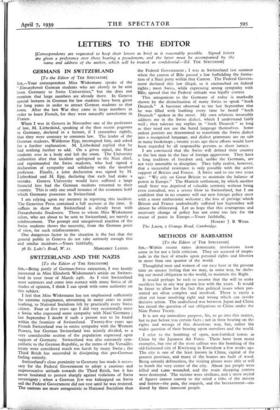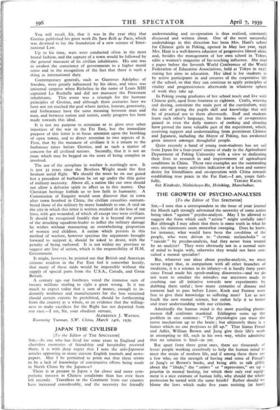METHODS OF BARBARISM
[To the Editor of THE SPECTATOR]
S nt,—Within recent times democratic institutions have come in for not a little criticism. They are accused of inepti- tude in the face of attacks upon personal rights and liberties in more than one quarter of the world.
Thoughtful men and women of our race have at the present time an uneasy feeling that we may, in some way, be shelv- ing our moral obligation to the world, to maintain the Right.
It would perhaps be rash to assume that the will to make sacrifices has in any way grown less with the years. It would be fairer to allow for the fact that political issues when pre- sented are often complex and involved. There is rarely a clear cut issue involving right and wrong which can invoke decisive action. The undeclared war between Japan and China has raised the question of our obligations to China under the Nine Power Treaty.
It is not my immediate purpose, Sir, to go into this matter, but to put before you certain facts ; not in their bearing on the rights and wrongs of this disastrous war, but, rather the wider question of their bearing upon ourselves and the world.
I refer to the bombing of open, non-fortified towns in China by the Japanese Air Force. There have been many examples, but one of the most callous was the bombing of the old-fashioned city of Kweiyang in Kweichow a few weeks ago. The city is one of the least known in China, capital of the poorest province, and many of the houses are built of wood. Being entirely defenceless, the visiting planes were able at will to bomb the very centre of the city. About 30o people were killed and r,000 wounded, and the main shopping centres were destroyed. The victims were civilians, and a mere recital of figures cannot convey to the mind a tithe of the misery and horror—the pain, the anguish, and the bereavement—en- dured by these innocent people. You will recall, Sir, that it was in the year 1625 that Grotius published his great work De lure Belli ac Pads, which was destined to lay the foundation of a new science of Inter- national Law.
Up to his time, wars were conducted often in the most brutal fashion, and the capture of a town would be followed by the general massacre of its civilian inhabitants. His aim was to awaken the conscience of governments to a higher moral sense and to the recognition of the fact that there is such a thing as international duty.
Contemporary generals, such as Gustavus Adolphus, of Sweden, were greatly influenced by his ideas, and there was universal surprise when Richelieu in the name of Louis XIII captured La Rochelle and did not massacre the Protestant inhabitants. This event was a triumph for the humane principles of Grotius, and although three centuries later we have not yet reached the goal where justice, honour, generosity, and forbearance have the same meaning between man and man, and between nation and nation, costly progress has been made towards this ideal.
It is not my purpose to minimise or to gloss over other injustices of the war in the Far East, but the immediate purpose of this letter is to focus attention upon the bombing of open towns, and to direct attention to two aspects of it. First, that by the massacre of civilians it is a return to the barbarous times before Grotius, and as such a matter of concern for all civilised nations. Secondly, that it is not an issue which may be begged on the score of being complex or involved.
The use of the aeroplane in warfare is startlingly new. It is just 35 years since the Brothers Wright made the first hesitant aerial flight. We should the more be on our guard lest a precedent of .barbarism be set up under the thin guise of military necessity. Above all, a nation like our own should not allow a defeatist spirit to affect us in this matter. Our Christian heritage forbids us to lose faith in humanity. A Commission of Enquiry would soon discover that in town after town bombed in China, the civilian casualties outnum- bered those of the military by many hundreds to one. A raid on the city in which this letter is written resulted in the loss of too lives, with 40o wounded, of which all except two were civilians. It should be recognised frankly that it is beyond the power of the attacking squadron-leader to inflict the military damage he wishes without massacring an overwhelming proportion of women and children. A nation which persists in this method of warfare, however specious the arguments brought forward to support it, should be asked to desist, with the penalty of being outlawed. It is not within my province to suggest any line of action, which is the responsibility of H.M. Government.
It might, however, be pointed out that British and American citizens resident in the Far East feel it somewhat keenly, that many of these raids would be impossible without the supply of special parts from the U.S.A., Canada, and Great Britain.
A century ago our forebears voted the immense sum of twenty millions sterling to right a great wrong. Is it too much to expect today that a sum of money, enough to in- demnify workmen and manufacturers for the loss sustained should certain exports be prohibited, should be forthcoming from the country as a whole, as an evidence that the willing- ness to make sacrifices for the Right has not departed from our race.—I am, Sir, your obedient servant,
ALEXANDER J. WATSON.
Kunming Yunnan, S.W. China, March 14th, 1939.











































 Previous page
Previous page